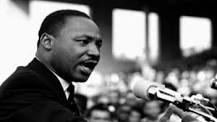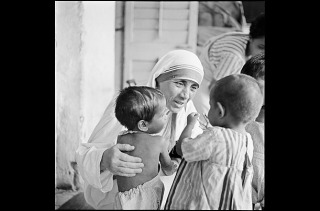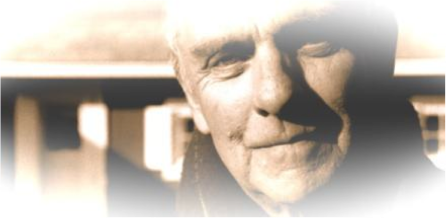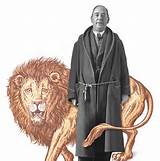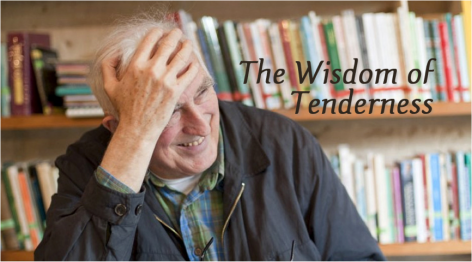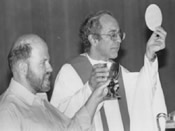
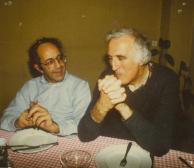
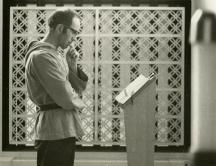
Biography
Henri Jozef Machiel Nouwen, (Nijkerk, January 24, 1932 – Hilversum, September 21, 1996) was a Dutch Catholic priest and writer who authored 40 books on the spiritual life.
His books are widely-read today by both Protestants and Catholics alike. The Wounded Healer, In the Name of Jesus, Clowning in Rome, The Life of the Beloved and The Way of the Heart are just a few of the more widely recognized titles. After nearly two decades of teaching at the Menninger Foundation Clinic in Topeka, Kansas, and at the University of Notre Dame, Yale University and Harvard University, he left to share his life with mentally handicapped people at the L’Arche community of Daybreak in Toronto, Canada. He died in September of 1996 from a sudden heart attack.
His spirituality was influenced by many, notably by his friendship with Jean Vanier. At the invitation of Vanier he visited L’Arche in France, the first of over 130 communities around the world where people with developmental disabilities live and share life together with those who care for them. In 1986 Nouwen accepted the position of pastor for a L’Arche community called “Daybreak” in Canada, near Toronto.
One of his most famous works is Inner Voice of Love, his diary between December 1987 to June 1988 during one of his most serious bouts with clinical depression.
Quotes
Ministers who have many projects, plans, and appointments, but who have lost their heart somewhere in the midst of their activities
-Henri Nouwen
When I think of the many lecture invitations I declined with the argument that I had no time to prepare, I see now how I looked at every speaking engagement-be it a lecture, a sermon or commencement address-as a new performance that calls for new preparation. As if I had to entertain a demanding audience that could not tolerate any poor performance. No wonder that this attitude leads to exhaustion and fatigue…now I see that I was all mixed up. The question is not, do I have time to prepare? But do I live in a state of preparedness.
-Henri Nouwen
In recent years, I have become more and more aware of my own tendency to think that the value of my presence depends on what I say or do. And yet it is becoming clearer to me every day that this preoccupation with performing in fact prevents me from letting God speak through me in any way he wants, and so keeps me from making connections prior to any special word or deed….over the years we have developed the idea that being present to people in all their needs is our greatest and primary vocation. The Bible does not seem to support this. Jesus’ primary concern was to be obedient to his Father, to live constantly in his presence. Only then did it become clear to him what his task was in his relationship with people.
-Henri Nouwen
In the middle of sentences loaded with action-healing suffering people, casting out devils, responding to impatient disciples, traveling from town to town and preaching from synagogue to synagogue-we find these quite words “in the morning long before dawn, Jesus got up and left the house, and went off to a lonely place and prayed there.” In the center of the breathless activities we hear a restful breathing. Surrounded by hours of moving we find a moment of quite stillness…the more I read this nearly silent sentence locked between the loud words of action, the more I have the sense that the secret place of Jesus’ ministry is hidden in that lonely place where he went to pray, early in the morning, long before dawn.
-Henri Nouwen
“In solitude we can slowly unmask the illusion of our possessiveness and discover in the center of our own self that we are not what we can conquer, but what is given to us. In solitude we can listen to the voice of him who spoke to us before we could speak a word, who healed us before we could make any gesture to help, who set us free long before we could free others, and who loved us long before we could give love to anyone. It is in this solitude that we discover that being is more important than having, and that we are worth more than the result of our effort. In solitude we discover that our life is not a possession to be defended, but a gift to be shared”
-Henri Nouwen (from Out of Solitude pg. 22)
Solitude is the furnace of transformation. Without solitude we remain victims of our society and continue to be entangled in the illusions of the false self. Jesus himself entered this furnace, and there he was tempted with the three compulsions of the world: to be relevant (“turn stones into loaves), to be spectacular (“throw yourself down”), and to be powerful (“I will give you all these kingdoms”). There he affirmed God as the only source of his identity (“You must worship the LORD your God and serve him alone”). Solitude is the place of the great struggle and the great encounter—the struggle against the compulsions of the false self, and the encounter with the loving God who offers himself as the substance of the new self.”
-Henri Nouwen
“In solitude I get rid of my scaffolding: no friends to talk with, no telephone calls to make…The task is to persevere in my solitude, to stay in my cell until all my seductive visitors get tired of pounding on my door and leave me alone.”
-Henri Nouwen (the way of the heart pg. 20-25)
Dear Lord, you are the first of the just. You lived the righteous life. It is because of you that your heavenly Father keeps this world in existence and shows us such mercy to us sinners. who am I, Lord, to expect your love, protection, and mercy? Who am I to deserve a place in your heart, in your house, in your reign? Who am I, Lord, to hope in your forgiveness, your friendship, your embrace? and still this is what I am waiting for, expecting, even counting on! Not because of my own merits, but solely because of your immense mercy. You lived for us the life that is pleasing to God. O Lord, you are the just one, the blessed one, the beloved one, the righteous one, the gracious one. I pray that your Father, the Father of all people, the One who created me and sustains me day in and day out, may recognize in me your marks and receive me because of you. Help me to follow you, to unite my life with yours and to become a mirror of your love
-Henri Nouwen
More and more, the desire grows in me simply to walk around, greet people, enter their homes, sit on their doorsteps, play ball, throw water, and be known as someone who wants to live with them. It is a privilege to have the time to practice this simple ministry of presence. Still, it is not as simple as it seems. My own desire to be useful, to do something significant, or to be part of some impressive project is so strong that soon my time is taken up by meetings, conferences, study groups, and workshops that prevent me from walking the streets. It is difficult not to have plans, not to organize people around an urgent cause, and not to feel that you are working directly for social progress. But I wonder more and more if the first thing shouldn’t be to know people by name, to eat and drink with them, to listen to their stories and tell your own and to let them know with words, handshakes, and hugs that you do not simply like them, but you truly love them.”
-Henri Nouwen
For a person of prayer is, in the final analysis, the person who is able to recognize in others the face of the Messiah and make visible what was hidden, make touchable what was unreachable. The person of prayer is a LEADER precisely because through their articulation of God’s work WITHIN THEM, they can lead others out of confusion to clarification, through their compassion, they can guide them out of closed circuits of their in-groups to the wide world of humanity, and through their critical contemplation they can convert their destructiveness into creative work for the new world to come.
-Henri Nouwen
Giving yourself to others is only possible when you have been fully received…only when you know yourself as unconditionally loved-that is fully received by God-can you give gratuitously. Giving without wanting anything in return is trusting that all of your needs will be provided by the one who loves you unconditionally. It is trusting that you do not need to protect your own security but can give yourself completely to the service of others…you cannot give yourself to others if you do not own yourself, and you can only truly own yourself when you have been fully received in unconditional love. Often what looks like love is really a cry for affection or support. When you know yourself as fully loved you will be grateful for what is given to you without clinging to it, and joyful for what you can give without bragging about it. You will be a free person….Free to love!
-Henri Nouwen
The goal of our life is not people it is God. Only in him shall we find the rest we seek. It is therefore to solitude that we must return, not alone, but with all those we embrace through our ministry. This return continues until the time when the same Lord who sent us into the world calls us back to be with Him in never-ending communion.
-Henri Nouwen
The goal of education and formation of the ministry is continually to recognize the Lord’s voice, his face, and his touch in every person we meet
-Henri Nouwen
Long before any human being saw us, we are seen by God’s loving eyes. Long before anyone heard us cry or laugh, we are heard by our God who is all ears for us
-Henri Nouwen
Here is the mystery of my life is unveiled, I am loved so much that I am left free to leave home. The blessing is here from the beginning. I have left and keep leaving it. But the father is always looking for me with outstretched arms to receive me back and to whisper again in my ear, “You are my Beloved on you my favor rests”
-Henri Nouwen
The farther I run away from the place God dwells, the less I am able to hear the voice that calls me the Beloved, and the less I hear the voice, the more entangled I become in the manipulations and power games of the world.
-Henri Nouwen
There is so much fear in us. Fear of people, fear of God, and much raw, undefined, free-floating anxiety. I wonder if fear is not our main obstacle to prayer. When we enter into the presence of God start to sense that huge reservoir of fear in us, we want to run away into the many distractions which our busy world offers us so abundantly. But we should not be afraid of our fears. We can confront them, give words to them, and lead them into the presence of the one who says, “Do not be afraid, it is I.” Our inclination is to show our Lord only what we feel comfortable with. But the more we dare to reveal our whole trembling self, the more we will be able to sense that God’s love, which is perfect love, casts out all fears.
-Henri Nouwen
O Lord, I pray that your children may come to feel your presence and be immersed in your deep, warm, affective love. And to me, O Lord, your stumbling friend, show your mercy…. Amen
-Henri Nouwen
Spiritual life is the life of God’s Spirit within us, both as individuals and as a community. Therefore the point of spiritual formation is to discern where something is happening. The reason for this is that there is a real tendency in us to think of the spiritual life as a life that will begin when we have certain feelings, think certain thoughts, or gain certain insights. The problem, however, is not how to make the spiritual life happen, but to see where it actually is happening. We work on the premise that God acts in this world, in the lives of individuals and communities. God is doing something. Our task is to become aware of where and how God is presently acting and to recognize that indeed it is God who is acting. Our task is to help people see that in fact they are involved in the spiritual life already…
-Henri Nouwen
Obedience means listening to and really hearing how much God loves us. Obedience means, therefore, slowly allowing God’s Spirit to draw us to places some of which we might rather avoid. For God is a demanding God. God’s love is a demanding love. God demands a lot of us, but he demands it out of love.
-Henri Nouwen
I think that real teaching and preaching should create community, create a joyful recognition of being a part of the same human condition. So I feel quite often that the purpose of teaching or lecturing or preaching is indeed to bring people together. It’s a form of convening. As a minister you are a convener.
-Henri Nouwen
I have noticed one thing in particular: increasing prosperity has not made people more friendly toward one another. They’re better off; but that newfound wealth has not resulted in a new sense of community. I get the impression that people are more preoccupied with themselves and have less time for one another that when they didn’t possess so much. There’s more competitiveness, more envy, more unrest, and more anxiety. There’s less opportunity to relax, to get together informally, and enjoy the little things in life. Success has isolated a lot of people and made them lonely.
-Henri Nouwen
I think it’s this mentality that lies behind a lot of anxiety, unrest, and agitation. Its as though we’re forever on the go, trying to prove to each other that we deserve to be loved. The doubt we harbor within us drives us on to ever-greater activity. In that way we try to keep our heads above water and not drown in our ever-increasing lack of self-respect. The enormous propensity to seek recognition, admiration, popularity, and renown is rooted in the fear that without all this we are worthless. You could call it the “commercialization” of love. Nothing for nothing. Not even love.
-Henri Nouwen
We fail to know our hidden center; and so we live and die often without knowing who we really are. If we ask ourselves why we think, feel, and act in a certain way, we often have no answer, thus proving to be strangers in our own house.
-Henri Nouwen
Prayer is the bridge between my unconscious and conscious self. Prayer connects my mind with my heart, my will with my passions, my brain with my belly. Prayer is the way to let the life-giving Spirit of God penetrate all the corners of my being. Prayer is the divine instrument of my wholeness, unity and inner peace.
-Henri Nouwen
For me personally, prayer becomes more and more a listening to the blessing. I have read and written much about prayer, but when I go to a quiet place to pray, I realize that, although I have a tendency to say many things to God, the real “work” of prayer is to become silent and listen to the voice that says good things about me. This might sound self-indulgent, but, in practice, it is a hard discipline. I am so afraid of being cursed, of hearing that I am no good or not good enough, that I quickly give in to the temptation to start talking and to keep talking in order to control my fears. To gently push aside and silence the many voices that question my goodness and to trust that I will hear a voice of blessing…that demands real effort
-Henri Nouwen
I still believe deeply that our few years on this earth are part of a much larger event that stretches out far beyond the boundaries of our birth and death. I think of it as a mission into time a mission that is very exhilarating and even exciting. Mostly because the One who sent me on the mission is waiting for me to come home and tell the story of what I have learned.
-Henri Nouwen
O Lord Jesus, you who came to us to show the compassionate love of your Father, make your people know this love with their hearts, minds and souls. So often we feel lonely, unloved, and lost in the valley of tears. We desire to feel affection, tenderness, care, and compassion, but suffer from inner darkness, emptiness, and numbness. I pray tonight: Come, Lord Jesus, come. Do not just come to our understanding, but enter our hearts—our passions, emotions, and feelings—and reveal your presence to us in our inmost being. As long as you remain absent from that intimate core of our experience, we will keep clinging to people, things, or events to find some warmth, some sense of belonging. Only when you really come, really touch us, set us ablaze with your love, only then will we become free and let go of all false forms of belonging. Without that inner warmth, all our ascetical attempts remain trivial, and we might even get entangled in the complex network of our own good intentions.
-Henri Nouwen
Nouwen remarked of his experience with the people of L’Arche, “If they express love for you, then it comes from God. It’s not because you accomplished anything. These broken, wounded, and completely unpretentious people forced me to let go of my relevant self—the self that can do things, show things, prove things, build things—and forced me to reclaim that unadorned self in which I am completely vulnerable, open to receive and give love regardless of any accomplishments.”
-Henri Nouwen
A Rule offers ‘creative boundaries within which God’s loving presence can be recognized and celebrated.’ It does not prescribe but invite, it does not force but guide, it does not threaten but warn, it does not instill fear but points to love. In this it is a call to freedom, freedom to love
-Henri Nouwen.
A spiritual discipline…is the concentrated effort to create some inner and outer space in our lives…A spiritual discipline sets us free to pray, or to say it better, allows the Spirit of God to pray in us.
-Henri Nouwen (‘Making All Things New’)
“true solitude far from being the opposite of community life is the place where we come to realize that we were together before we came together and that community life is not a creation of the human will but an obedient response to the reality of our being united. Many people who have lived together for years and whose love for one another has been tested more than once know that the decisive experience in their life was not that they were able to hold together but that they were held together. That in fact we are a community not because we like each other or have a common task or project but because we are called together by God.”
-Henri Nouwen
“To live a life that is not dominated by the desire to be relevant but is instead safely anchored in the knowledge of God’s first love, we have to be mystics—a mystic is a person whose identity is deeply rooted in God’s first love.”
-Henri Nouwen
“The mystery of ministry is that we have been chosen to make our own limited and very conditional love the gateway for the unlimited and unconditional love of God.”
-Henri Nouwen
“Stop wondering around. Instead come home and trust that God will bring you what you need; For as long as you can remember, you have been a pleaser, depending on others to give you an identity. But now you are being asked to let go of all these self made props and trust that God is enough for you…the root choice is always trust at all times that God is with you and will give you what you most need.”
-Henri Nouwen
“truly accepting love, forgiveness, and healing is often much harder than giving it. The place beyond earning, deserving, and rewarding. Place of surrender and complete trust. I did not realize how deeply rooted my resistance was and how agonizing it would be too…”come to my senses, fall on my knees and let my tears fall freely…to become part of the story of the prodigal son…each step seemed impossible; to let go one more time of wanting to be in control, the desire to predict life, fear of not knowing where it will all lead, and surrender to a love that knows no limits. I will never be able to live the great commandment to love without allowing myself to be loved without conditions or prerequisites.
-Henri Nouwen
“a stranger as someone who is estranged from their own past, culture and country, from their neighbors, friends and family, from their deepest self and from God.”
-Henri Nouwen
“The way of the Christian leader is not the way of upward mobility in which our world has invested so much, but the way of downward mobility ending on the cross…powerlessness and humility in the spiritual life do not refer to people who have no spine and who let everyone make decisions for them. They refer to people who are so deeply in love with Jesus that they are ready to follow him wherever he guides them, always trusting that, with him, they will find life and find it abundantly.”
-Henri Nouwen (In the Name of Jesus p.62-64)
“Receptivity without confrontation leads to a bland neutrality that serves nobody. Confrontation without receptivity leads to an oppressive aggression which hurts everybody.”
-Henri Nouwen
“We always seem to have something more urgent to do and ‘just sitting there’ and ‘doing nothing’ often disturbs us more than it helps. But there is no way around this. Being useless and silent in the presence of God belongs to the core of all prayer. In the beginning we often hear our own unruly noises more loudly than God’s voice. This is at times very hard to tolerate. But slowly, very slowly, we discover that the silent time makes us quiet and deepens our awareness of God. Then, very soon, we start missing these moments when we are deprived of them, and before we are fully aware of it an inner momentum has developed that draws us more and more into silence and closer to that still point where God speaks to us.”
-Henri Nouwen (‘Reaching Out’)
“Listen to your heart. It’s there that Jesus speaks most intimately to you. Praying is first and foremost about listening to Jesus, who dwells in the very depths of your heart. He doesn’t shout. He doesn’t thrust himself upon you. His voice is an unassuming voice, very nearly a whisper, the voice of a gentle love.”
-Henri Nouwen Way of the Heart
“Reading the scriptures is not as easy as it seems since in our academic world we tend to make anything and everything we read subject to analysis and discussion. But the word of God should lead us first of all to contemplation and meditation. Instead of taking the words apart, we should bring them together in our innermost being; instead of wondering if we agree or disagree, we should wonder which words are directly spoken to us and connect directly with our most personal story. Instead of thinking about the words as potential subjects for an interesting dialogue or paper, we should be willing to let them penetrate into the most hidden corners of our heart, even to those places where no other word has yet to find entrance. Then and only then can the word bear fruit as seed sown in rich soil. Only then can we really “hear and understand.”
-Henri Nouwen Reaching Out
“Old and New Testament stories not only show how serious our obligation is to welcome the stranger into our home, but they also tell us that guests are carrying precious gifts with them, which they are eager to reveal to a receptive host. When Abraham received three strangers at Mamre and offered them water, bread and fine tender calf, they revealed themselves to him as the Lord announcing that Sarah his wife should give birth to a son (Genesis 18:1-15). When the widow of Zarephath offered food and shelter to Elijah, he revealed himself as a man of God offering her an abundance of oil and meal and raising her son from the dead (I Kings 17:9-24). When the two travelers to Emmaus invited the stranger, who had joined them on the road to stay with them for the night, he made himself known in the breaking of the bread as their Lord and Saviour (Luke 24: 13-35)
When hostility is converted to hospitality then fearful strangers can become guests revealing to their hosts the promise they are carrying with them. Then in fact, the distinction between host and guest proves to be artificial and evaporates in the recognition of the new found unity. Thus the biblical stories help us to realize not jus that hospitality is an important virtue, but even more that in the context of hospitality guest and host can reveal their most precious gifts and bring new life to each other.”
-Henri Nouwen Reaching Out
Joy is essential to the spiritual life. Whatever we may think or say about God, when we are not joyful, our thoughts and words cannot bear fruit. Jesus reveals to us God’s love so that his joy may become ours and that our joy may become complete. Joy is the experience of knowing that you are unconditionally loved and that nothing—sickness, failure, emotional distress, oppression, war, or even death—can take that love away…
Still, nothing happens automatically in the spiritual life. Joy does not simply happen to us. We have to choose joy and keep choosing it every day. It is a choice based on the knowledge that we belong to God and have found in God our refuge and our safety and that nothing, not even death, can take God away from us…it is important to become aware that at every moment of our life we have an opportunity to choose joy. Life has many sides to it. There are always sorrowful and joyful sides to the reality we live. And so we always have choice to live in the moment as a cause for resentment or as a cause for joy. It is in the choice that our true freedom lies, and that freedom is, in the final analysis, the freedom to love. It might be a good idea to ask ourselves how we develop our capacity to choose joy. Maybe we could spend a moment at the end of each day and decide to remember that day—whatever may have happened—as a day to be grateful for. In so doing we increase our hearts capacity to choose for joy. And as our heart becomes more joyful, we will become, without any special effort, a source of joy for others. Just as sadness begets sadness, so joy begets joy.”
-Henri Nouwen Here and Now
“The mystery of God’s presence, can be touched only be a deep awareness of his absence. It is in the center of our longing for the absent God that we discover his footprints, and realize that our desire to love God is born out of the love with which he has touched us. In the patient waiting for the loved one, we discover how much he has filled our lives already. Just as the love of a mother for her son can grow deeper when he is away, just as children can learn to appreciate their parents more when they have left the home, just as lovers can rediscover each other during long periods of absence, so our intimate relationship with God can become deeper and more mature by the purifying experience of his absence. By listening to our longings, we hear God as their creator. By touching the center of solitude, we sense that we have been touched by loving hands. By watching carefully the endless desire to love, we come to the growing awareness that we can love only because we have been loved first, and that we can offer intimacy only because we are born out of the inner intimacy of God himself.”
-Henri Nouwen Reaching Out
“I am beginning now to see how radically the character of my spiritual journey will change when I no longer think of God as hiding out and making it difficult as possible for me to find him, but, instead, as the one who is looking for me while I am doing the hiding.”
-Henri Nouwen
“When Jesus was moved to compassion, the source of all life trembled, the ground of all love burst open, and the abyss of God’s immense, inexhaustible and unfathomable tenderness revealed itself.”
-Henri Nouwen Compassion
“Compassion asks us to go where it hurts to enter into the places of pain, to share in brokenness, fear, confusion, and anguish. Compassion challenges us to cry out with those in misery, to mourn with those who are lonely, to weep with those in tears. Compassion requires us to be weak with the weak, vulnerable with the vulnerable, and powerless with the powerless. Compassion means immersion in the condition of being human.”
-Henri Nouwen Compassion
“Since I was very young my life has been dominated by two strong voices. The first said, “Make it in the world and be sure you can do it on your own.” And the other voice said, “Whatever you do for the rest of your life, even if it’s not very important, be sure you hold on to the love of Jesus.” Again the first voice urged me to make my mark, and make sure I do something relevant. And the other voice said, “Don’t lose touch with Jesus, who chose a very humble and simple way. Jesus by his life and death will be your example for living.” I’ve struggled because one voice seemed to be asking for upward mobility and the other for downward mobility and I was never sure how to do both at the same time.”
-Henri Nouwen ‘Home Tonight’
“In the competitive world we live in the word “home,” means very little. Success, power, and prestige obliterate the concepts of community, intimacy, and togetherness.”
-Henri Nouwen
When I saw the men and women who announced their covenant with Jesus and the poor, I saw how real this downward way of Jesus is and how, if I go this way, I go not alone, but as a member of the “body of Jesus.” Seldom have I experienced so directly the difference between individual heroism and communal obedience. Whenever I think about becoming poor as something I must accomplish, I become oppressed. But as soon as I realize that my brothers and sisters call me to go this way with them in obedience to Jesus. I am filled with hope and Joy
-Henri Nouwen ( The Road to Daybreak)
“As soon as we are alone…chaos opens up in us. This chaos can be so disturbing and so confusing that we can hardly wait to get busy again. Entering a private room and shutting the door, therefore does not mean that we immediately shut out all our inner doubts, anxieties, fears, bad memories, unresolved conflicts, angry feelings and impulsive desires. On the contrary, when we have removed our outer distractions, we often find that our inner distractions manifest themselves to us in full force. We often use the outer distractions to shield ourselves from the interior noises. This makes the discipline of solitude all the more important.”
-Henri Nouwen
“Solitude is the place where Christ remodels us in his own image and frees us from the victimizing compulsions of the world.”
-Henri Nouwen
For a long time, I sought safety and security among the wise and clever, hardly aware that the things of the Kingdom were revealed to “little children”; that God has chosen “those who by human standards are fools to shame the wise.” But when I experienced the warm, unpretentious reception of those who have nothing to boast about, and experienced a loving embrace from people who didn’t ask any questions, I began to discover that a true spiritual homecoming means a return to the poor in spirit to whom the Kingdom of Heaven belongs.
-Henri Nouwen
Gratitude is not a simple emotion or an obvious attitude. It is a difficult discipline to constantly reclaim my whole past as the concrete way in which God has led me to this moment and is sending me into the future. It is hard precisely because it challenges me to face the painful moments – experiences of rejection and abandonment, feelings of loss and failure – and gradually to discover in them the pruning hands of God purifying my heart for deeper love, stronger hope, and broader faith.
-Henri Nouwen
“Mystics are men and women of God who ardently desire to dwell in God’s presence, to listen ot God’s voice, to look at God’s beauty, to touch God’s incarnate Word an to taste fully God’s infinite goodness.”
-Henri Nouwen (In the Name of Jesus 29-30)
“God, help me to see others not as my enemies or as ungodly but rather as thirsty people. And give me the courage and compassion go offer your Living Water, which alone quenches deep thirst.”
-Henri Nouwen
“The desire to save, whether from sin or poverty or exploitation, is one of the most damaging motives in ministry. “Humility is the real Christian virtue…when we come to realize that…only God saves, then we are free to serve, then we can live truly humble lives. It makes all the difference in the world whether I view my neighbor as a potential convert or as someone whom God already loves.”
-Henri Nouwen
“Our life in Christ and our ministry in his name belong together as the two beams of the cross.”
-Henri Nouwen ‘The Selfless Way of Christ’
“There is a profound difference between the false ambition for power and the true ambition to love and serve. It is the difference between trying to raise ourselves up and trying to lift up our fellow human beings.”
-Henri Nouwen ‘The Selfless Way of Christ’
“The spiritual life is a life guided by the same Spirit who guided Jesus Christ. The Spirit is the breath of Christ in us, the divine power of Christ active in us, the mysterious source of new vitality by which we are made aware that it is not we who live, but Christ who lives in us (Galatians 2:20). Indeed, to live a spiritual life means to become living Christs. It is not enough to try to imitate Christ as much as possible; it is not enough to remind others of Jesus; it is not even enough to be inspired by the words and actions of Jesus Christ. No, the spiritual life presents us with a far more radical demand: to be living Christs here and now, in time and history.”
-Henri Nouwen ‘The Selfless Way of Christ’
Regardless of the particular shape we give to our lives, Jesus’ call to discipleship is primal, all-encompassing, all-inclusive, demanding a total commitment. One cannot be a little bit for Christ, give his some attention, or make him one of many concerns.”
-Henri Nouwen ‘The Selfless Way of Christ’
“To pray is to walk in the full light of God, and to say simply, without holding back, ‘I am human and you are God.’ At that moment, conversion occurs, the restoration of the true relationship. A human being is not someone who once in a while makes a mistake, and God is not some who now and then forgives. No, human beings are sinners and God is love.”
-Henri Nouwen
Waiting is not a very popular attitude. Waiting is not something that people think about with great sympathy. In fact, most people consider waiting a waste of time. Perhaps this is because the culture in which we live is basically saying, “Get going! Do something! Show you are able to make a difference! Don’t just sit there and wait!” For many people, waiting is an awful desert between where they are and where they want to go. And people do not like such a place. They want to get out of it by doing something.
-Henri Nouwen
“You have to trust that every true friendship has no end …. The love you give and receive is a reality that will lead you closer and closer to God as well as to those whom God has given you to love.”
-Henri Nouwen

